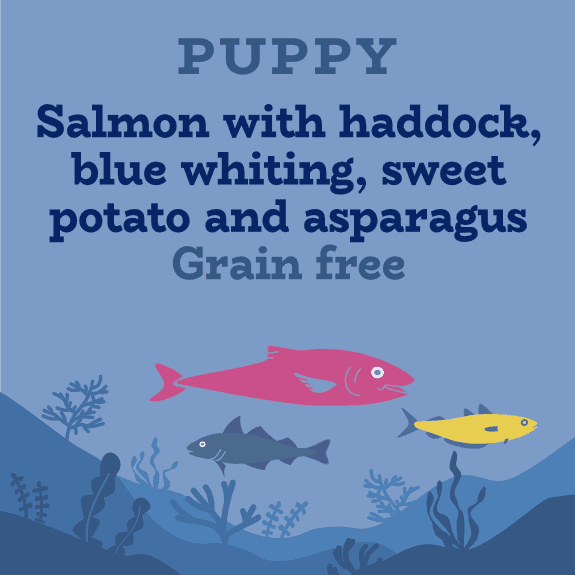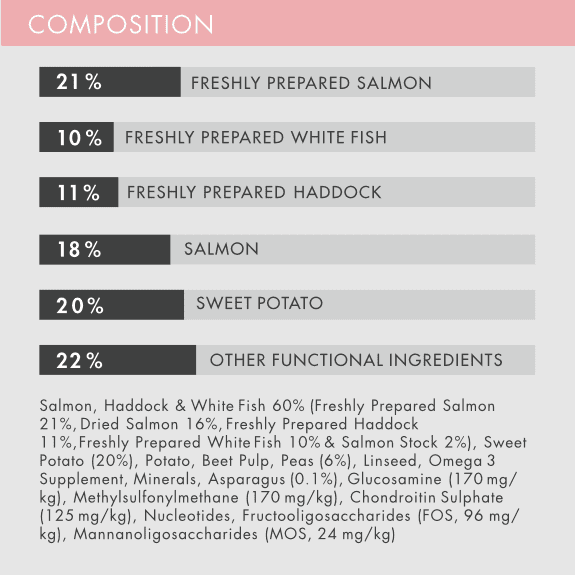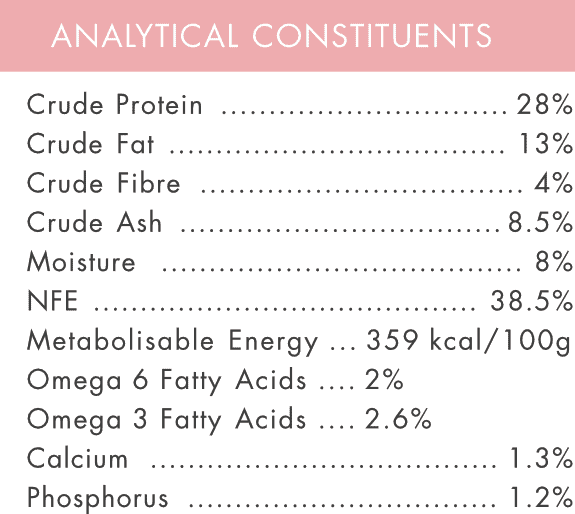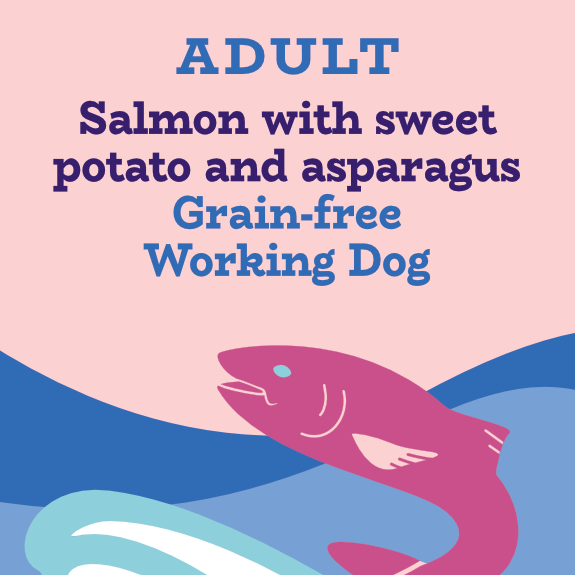Single source grain and legume free 65% salmon and sweet potato, high protein recipe, with super greens, including dill, spinach and fennel.
This natural grain free salmon and sweet potato dry dog food is an ideal recipe for high performance dogs or dogs requiring a high protein dog food recipe. It has been formulated to include a number of Superfoods such as dill, spinach and fennel, which are rich in antioxidants. This recipe also contains the natural prebiotics MOS and FOS to help improve you dog's gut health. This is, therefore, a good dry dog food for digestive problems. Our human-grade salmon and sweet potato recipe is free from the typical ingredients that are known to cause allergies, also making it an ideal recipe for dogs with any digestive sensitivities.
Legume-free
Some dogs have issues with legumes due to digestive sensitivities, allergies, and potential heart health concerns. Legumes can cause gas, bloating, and digestive upset, and some dogs may be allergic or intolerant. Additionally, legumes might be linked to dilated cardiomyopathy (DCM) and nutrient imbalances. Always consult a vet for dietary advice.
Download ingredients and nutritional infomation (PDF)
Salmonsource of high-quality protein, which is essential for building and repairing muscles, bones, and other tissues. It is also rich in omega-3 fatty acids, which can help reduce inflammation and improve skin and coat health. These fatty acids can also support brain function and help maintain healthy joints in dogs. Additionally, salmon is a good source of vitamins and minerals such as vitamin D, vitamin B12, and selenium. Including salmon in a dog's diet can promote overall health and vitality, and can be particularly beneficial for dogs with skin or joint issues.
Dill
Dill is a herb with a range of potential health benefits. One of the main benefits of dill is its anti-inflammatory properties, which may help to reduce inflammation and alleviate symptoms of conditions such as arthritis. Dill also contains compounds that have been shown to support digestive health, helping to alleviate issues such as bloating, flatulence, and constipation. Furthermore, dill is rich in antioxidants, which may help to protect against cellular damage and reduce the risk of chronic diseases such as cancer. Lastly, dill has been shown to have antibacterial properties and may help to fight off harmful bacteria in the body.
Spinach
Spinach is a leafy green vegetable that is packed with nutrients and health benefits. One of the main benefits of spinach is its high content of vitamins and minerals, including vitamin C, vitamin K, folate, iron, and calcium. These nutrients help to support bone health, immune function, and healthy blood circulation. Additionally, spinach is rich in antioxidants, which may help to protect against cellular damage and reduce the risk of chronic diseases such as cancer and heart disease. Finally, the fiber content in spinach can help to promote digestive health and prevent constipation.
Fennel
Fennel is an herb that is known for its many health benefits. It is a rich source of nutrients such as vitamin C, potassium, and fiber. Fennel is also an excellent source of antioxidants that can help to protect your body against damage from free radicals. One of the key benefits of fennel is that it can aid in digestion. Fennel contains compounds that can help to reduce inflammation in the digestive tract, which can alleviate symptoms of bloating and gas. Additionally, fennel can help to stimulate the production of digestive enzymes, which can aid in the breakdown of food. Fennel has also been shown to have anti-inflammatory properties that can help to reduce inflammation throughout the body. This can be particularly beneficial for individuals who suffer from conditions such as arthritis or asthma. Finally, fennel has been shown to have antimicrobial properties that can help to fight off harmful bacteria and viruses.
Asparagus
Asparagus is a highly nutritious vegetable that is packed with a variety of health benefits. Not only is it low in calories, but it is also rich in fiber, vitamins, and minerals. One of the major benefits of asparagus is that it is great for digestive health. The high fiber content of asparagus helps to regulate bowel movements and prevent constipation. Asparagus is also known to be beneficial for heart health. It contains high levels of folate, which can help to reduce the risk of heart disease. Additionally, asparagus is packed with antioxidants, which can help to prevent cell damage and reduce the risk of certain cancers. Another surprising benefit of asparagus is that it can help to improve brain function. It contains a unique compound called asparagine, which can help to reduce inflammation in the brain and improve cognitive function.





.png)
.png)

.png)
.png)